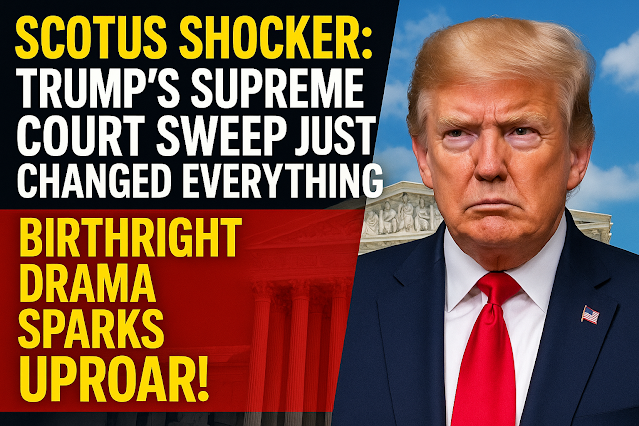SCOTUS Shocker: Trump’s Supreme Court Sweep Just Changed Everything – Birthright Drama Sparks Uproar!
Discover the explosive Supreme Court victories paving the way for presidential power grabs, birthright citizenship showdown, and Washington’s fiery political clash—your ultimate insider breakdown.
In a seismic shift that could redefine the U.S. presidency, the Supreme Court issued a string of rulings this week that heavily favored former President Donald Trump, igniting intense debate over judicial power, birthright citizenship, and Congressional oversight.
1. Nationwide Injunction Power Slashed 🎯
On June 27, the Court delivered a landmark decision dramatically limiting federal judges’ authority to issue nationwide injunctions—legal tools once used to block executive actions across the country. By curtailing this judicial weapon, Trump celebrated what he called a “monumental victory” in his battle against what he framed as judicial overreach youtube.com+4theguardian.com+4theguardian.com+4.
This ruling weakens a pillar of the checks‑and‑balances system, empowering the executive branch to enact and enforce controversial policies in more assertive, unilateral ways. Critics warned this shift could undercut judicial oversight and tilt the balance of power dangerously toward the presidency .
2. Birthright Citizenship in the Crosshairs
Yet the Court’s most explosive signal came from its decision relating to birthright citizenship—granting citizenship to anyone born on U.S. soil. The ruling didn’t endorse Trump’s proposal, but crucially limited judges from halting executive action on the issue. Trump hailed it as a victory, even as legal experts caution a full challenge to the policy could resurface later in court .
Expect this one to keep reverberating on the campaign trail—especially among conservative voters who support restricting automatic citizenship.
3. Senate Fights Over Iran War Powers
Congress added fuel to the fire this week. The Senate narrowly voted 53–47 against a resolution that would have mandated Trump's administration to get explicit Congressional approval before taking military action against Iran youtube.com+15theguardian.com+15theguardian.com+15.
This failure underscores the struggle between the legislative branch and the executive over who holds the ultimate say in foreign policy—and it grants Trump more freedom to act abroad without formal checks from Congress.
4. Trade Tensions with Canada Rattle Markets
In a sudden twist, Trump abruptly ended trade negotiations with Canada concerning its proposed digital services tax. This move blindsided Ottawa and rattled markets that had been cautiously optimistic about a deal theguardian.com.
Economists warn this may herald wider trade tensions, signaling Trump's willingness to play hardball—even with allies.
5. ACA & School Book Opt‑Out Still Standing
Not all rulings favored Trump. The Court upheld a key provision of the Affordable Care Act, along with a Texas law requiring age verification for porn sites and allowing parents to opt their kids out of LGBTQ+ book curriculum theguardian.com+1politico.com+1.
These wins delivered mixed signals: while confirming some social conservatism, they denied Trump total dominance of the Court’s decisions.
⚖️ Implications for the Biden Era—and Beyond
A Growing Executive Footprint
With injunctions curtailed, future presidents may push sweeping policies past the judiciary, altering how executive orders play out on the national stage.
Birthright Citizenship Battles Loom
Although this decision isn't a final word, it emboldens Trump and allies to push harder, with real consequences for millions of undocumented immigrants.
Foreign Policy Without Barriers
The Senate’s reversal on Iran powers means Trump—or any president—can engage militarily without prior Congressional approval—a major shift in war‑making norms.
Trade Risks Replay
Pulling out of talks with Canada could signal the start of renewed cyber‑tariff wars—or escalate into full trade skirmishes.
Judicial Instability
America’s judiciary now appears more politically volatile, with settled groundrules under threat if judges are barred from national injunctions.
The Political Chessboard ⚡
-
Trump’s Statement: Celebrated the rulings as victories against judicial overreach, pushing forward his image as the “strong leader” voters demanded news.yahoo.com+6theguardian.com+6youtube.com+6theguardian.com+1theguardian.com+1.
-
Democrats’ Alarm: Warning that these rulings upend constitutional checks, dismantling liberties and risking unchecked executive authority.
-
Court Under Scrutiny: Critics argue this marks a turning point where the Court risks losing public trust and morphing from guardian to facilitator of executive power.
What’s Next?
-
Birthright Citizenship Legal Showdown
Expect fresh lawsuits aiming to stall or overturn Trump’s proposed rules—potentially making their way back to the Supreme Court. -
Congressional Review of War Powers
Critics in Congress may fight for new statutory restraints requiring presidential transparency and approval for military actions. -
Economic Fallout Analysis
Watch for investor and trade responses to the Canada announcement—plus reactions from industries like tech and digital. -
Watchdog Response
Expect a boom in civic lawsuits, watchdog group activity, and state‑level legislative pushback against what could become unchecked executive authority.
Final Take
This week’s Supreme Court rulings mark a seismic shift in American governance. By stripping judges of nationwide injunction power and reshaping presidential authority on immigration and foreign affairs, the Court has handed Trump a strategic win—and raised harsh questions about the future of checks and balances. As Washington reels, one thing is clear: the constitutional tug‑of‑war has only just begun.

Comments
Post a Comment